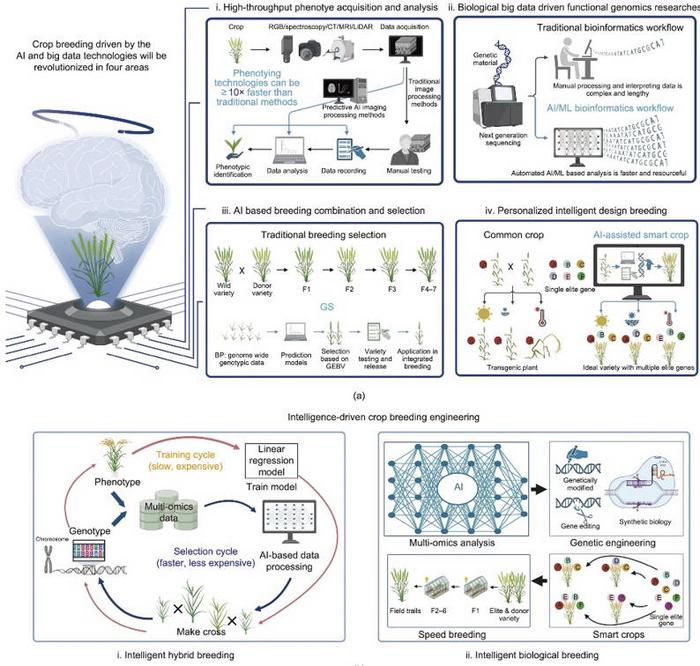A revolutionary shift is underway in the realm of agriculture as next-generation artificial intelligence (AI) and big data technologies redefine crop breeding. Traditional methods, once constrained by manual labor and limited data collection techniques, are giving way to sophisticated algorithms and high-throughput phenotyping that promise to streamline the process of creating new crop varieties. A comprehensive study published in the journal Engineering encapsulates this transformative journey and sheds light on how these advancements could bolster global food security.
Historically, crop breeding evolved from rudimentary techniques of domestication to the highly specialized methodologies we recognize today. This evolution, particularly in the last two decades, has introduced the concept of "Breeding 4.0." In this new paradigm, the integration of biotechnology and vast data streams cultivates a breeding approach that is not only intelligent but also personalized. Unlike earlier iterations of crop improvement, this stage enables breeders to tailor varieties to specific environmental conditions or market demands more effectively.
One of the most promising advancements is high-throughput phenotyping, a technique that allows for the rapid collection of extensive data on plant traits. Traditional trait acquisition methods relied heavily on manual observation, which was time-consuming and often inaccurate. However, with the advent of AI-powered sensors and imaging technologies, breeders can now obtain precise phenotypic profiles of crops quickly. For instance, the utilization of drones equipped with advanced imaging technologies can assess crop health, identify stress responses, and gather data on growth patterns without the need for contact or extensive field visits.
The integration of multiomics databases is a game-changer in understanding the genetic diversity of crops. These vast repositories compile information from various biological layers, such as genomics, transcriptomics, proteomics, and metabolomics. For example, databases like ZEAMAP for maize and SoyMD for soybean offer extensive resources for researchers to identify candidate genes and comprehend genetic regulatory mechanisms that govern important agronomic traits. By connecting these data types, scientists can better explore the complex interactions that influence crop performance.
AI plays a crucial role in analyzing these multifaceted datasets. The development of AI-based software tools enables researchers to decode intricate genetic regulatory networks. Through the efforts of research groups, such as the team from Huazhong Agricultural University, models predicting functional genes and regulatory pathways for crops like maize are being constructed. These significant advancements expedite the understanding of gene function and supporting precise breeding decisions, paving the way for improved crop resilience and yield.
Moreover, the benefits of AI extend to decision-making in breeding programs. AI-powered breeding software tools utilize big data to model breeding scenarios, thereby optimizing selection criteria and streamlining breeding cycles. By leveraging predictive analytics, these tools can anticipate the outcomes of various breeding strategies, allowing researchers to focus on the most promising lines and reduce the time required to develop new varieties significantly.
Despite the numerous advantages presented by cutting-edge technologies, the study highlights that China’s seed industry still faces significant barriers in achieving global competitiveness. While strides have been made in areas like germplasm resource identification and digitalization, there remain critical gaps in innovation, advanced methodologies, and the development of intelligent breeding systems. The reliance on traditional techniques in certain areas has curbed the potential for rapid progress, leaving an opportunity for other countries with advanced agricultural technologies to gain a head start.
To overcome these challenges, the research advocates for an intensified focus on developing automated intelligent phenotype acquisition technologies. Additionally, enhancing information fusion mechanisms to connect disparate data sources and creating algorithms for analyzing omics data on a grand scale will be essential. By envisioning a holistic development framework, the study proposes that China could achieve cornerstone technologies by 2040, reinforcing its position in the international seed industry and fulfilling the critical demands of food security.
As the landscape of crop breeding continues to unfold, it is clear that the fusion of agriculture with AI and big data is not merely an incremental change; it represents a profound shift in how human beings interact with our food systems. With the capacity to harness these tools effectively, the agricultural sector can increase yields, enhance resilience against climate change, and ensure sustainable practices that support global nutrition requirements.
Looking forward, the trends in crop breeding signify an era where efficiency meets innovation. The continuous evolution of technologies promises not only to improve crop performance but also to contribute significantly to addressing food shortages worldwide. As researchers and practitioners work collaboratively toward integrating biotechnology with data-driven approaches, the agricultural breakthroughs of tomorrow will ensure that humanity can meet its nutritional needs sustainably. The journey towards revolutionizing crop breeding is just beginning, and its potential impacts are extensive and far-reaching.
This research provides valuable insights into the future of crop breeding. As AI and big data technologies continue to evolve, they will likely play an even more significant role in ensuring global food security by enabling more efficient and sustainable crop breeding practices.
Subject of Research: Next-generation AI and big data in crop breeding
Article Title: Revolutionizing Crop Breeding: Next-Generation Artificial Intelligence and Big Data-Driven Intelligent Design
News Publication Date: 19-Dec-2024
Web References: https://doi.org/10.1016/j.eng.2024.11.034
References: Ying Zhang et al., Engineering
Image Credits: Ying Zhang et al.
Keywords: AI, big data, crop breeding, biotechnology, food security, phenotyping, multiomics, genetic diversity, predictive analytics, sustainable agriculture.




